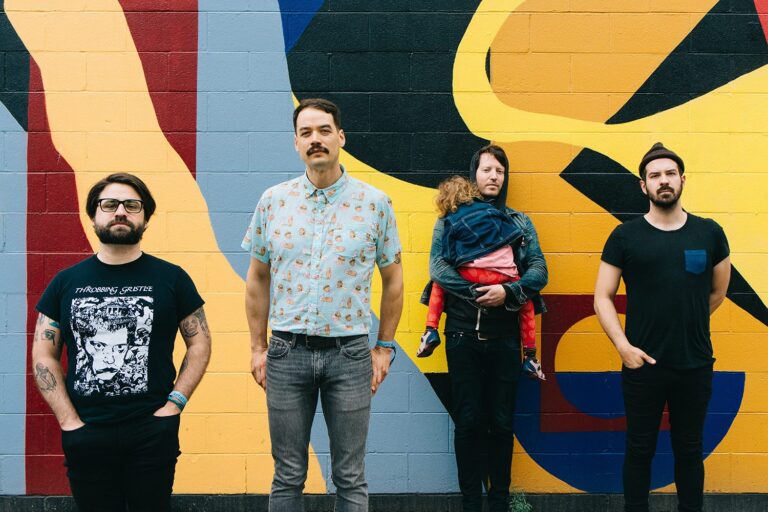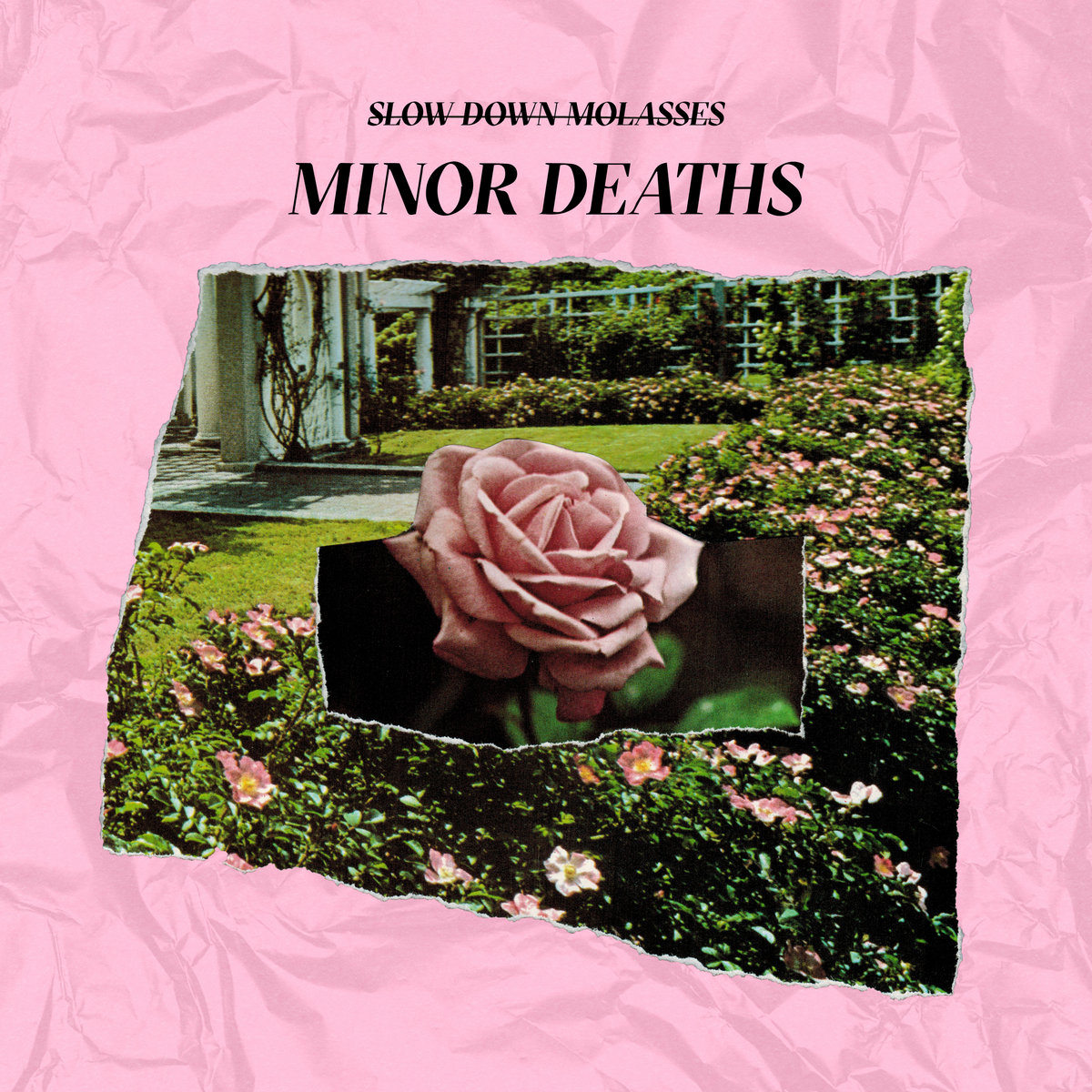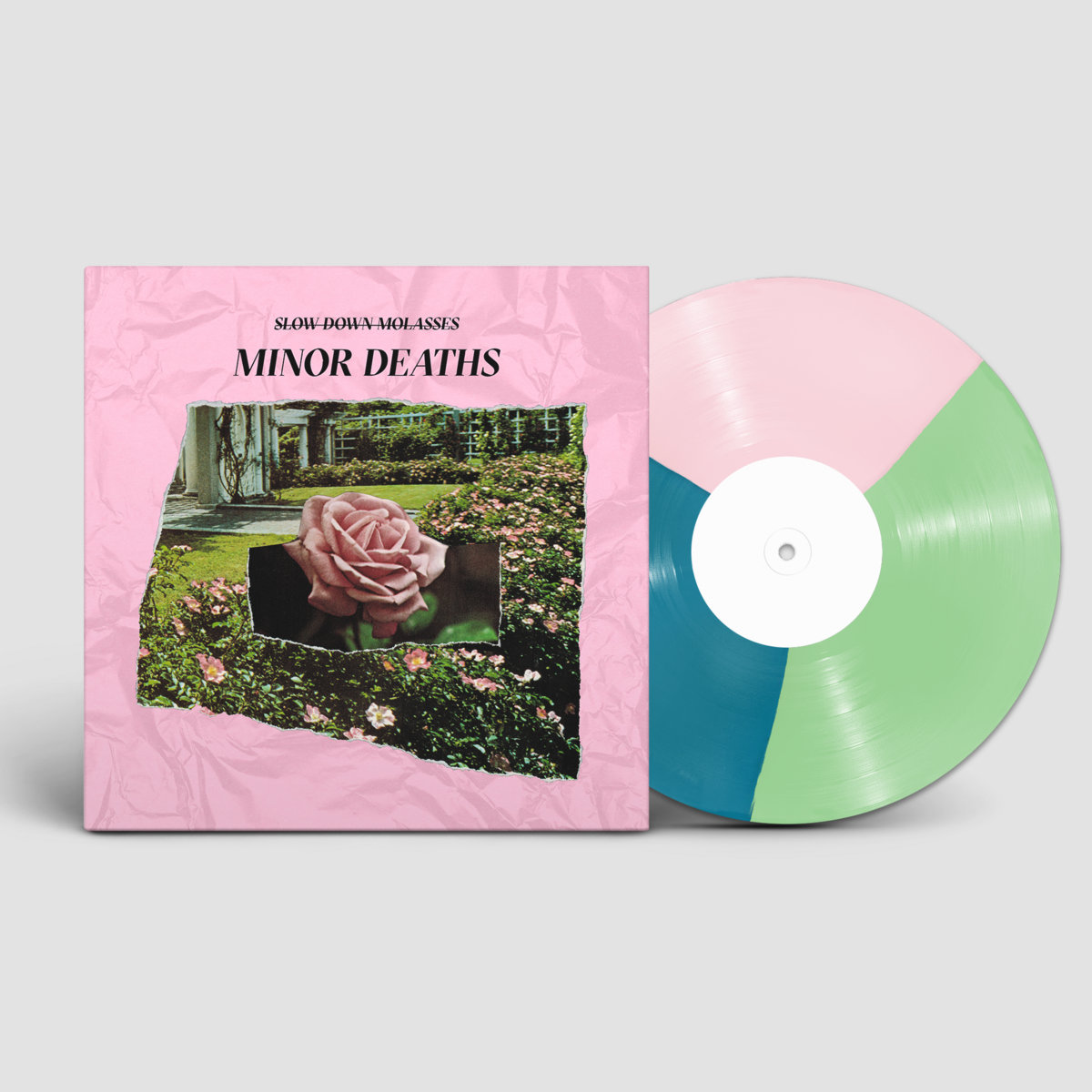Writing of the single ‘Street Haunting‘ back in April, we described how Saskatoon outfit Slow Down Molasses “blended anxious post-punk attitude with a certain pop charm, constantly trespassing over genre lines in order to evolve their noisy, catchy and often chaotic sound.” The project, which now consists of Aaron Scholz, Tyson McShane, Jordan Kurtz and Chrix Morix, put out album Minor Deaths earlier this autumn, a record which moves toward melodic indie rock while maintaining the anxious post-punk sensibilities. “This is captured in a taut, twitchy sound, McShane’s vocals fighting against growing disorder as peals of feedback threaten to unhinge the track,” we wrote in the preview. “Though just as it rises to breaking point, the tense rhythm wins out. Just another flash of unease on the ever-spinning world.”
The result is something full of both detail and weight, and one which rewards repeated listens. For these are songs that work on a visceral level, pulling the listener into frantic eddies and wide swells, but within these currents lie hidden depths. Be it clever lyricism, dual meanings or ambiguities in the mood that warrant closer inspection. Songs like opener ‘I Need the Darkness’ might feel like a kind of stalemate at first glance, the heaviness unable to blast away the sense of needling dread, but the reality is more dynamic. Slow Down Molasses are too interested in contradiction, too taken with change. There is no prevailing mood or conclusion, just a committed decision to embrace the energies of the contemporary moment in all of their frustrations, aggressions, vulnerabilities and dread.
We had the opportunity to ask the band a few questions, so read on below to find out more about the record.
Thanks for much for speaking with us. Congratulations on the release of Minor Deaths. How’s does it feel to have new music out in the world?
Tyson: Thank you so much. It’s so exciting and amazing to have it released, but also totally weird. It was supposed to come out in 2020, but the pandemic scuttled those plans, then we were supposed to spend the release week on tour in the UK, then pandemic cancelled those plans as well. So there is an odd underwhelming element to it with us not being on tour, but equally, we’ve received some very great support and have had many kind words written about it, so that has been really lovely. And just before the release we played packed festival shows in Germany and Estonia that were our first shows since the pandemic and were some of the most joyous moments I’ve ever had on (or off) stage.
Could we talk a little about the title? Minor Deaths. There are a number of ways to interpret it, but there’s a certain contradiction in the pair of words.
Tyson: There is definitely a certain contradiction to that pair of words, which worked well with this album. Lyrically, there are a lot of ruminations on how we interpret or react to changes whether they be within ourselves or society-wide. Often it is really easy to take something overly seriously and be over the top in your reaction to it, when in the long run it’s likely relatively minor.
This seems to be particularly true with men in our current era. How many men do you know that were called out or “cancelled”, but then within a short period of time, it was as if nothing had happened? But the frequent drama and self-pity of having to accept (often very minor) consequences is pretty ridiculous consider the impacts others have had to endure. One song, Revisionists, is specifically speaking to that. The fragility and outsized drama in many men’s reactions is remarkable. Not that the whole album is about that, but I think there is something to that mindset of questioning the out-sized reactions to your own personal situation that permeates a lot of the songs.
Also, from a more general perspective, I think the contradiction of those two terms suits the band and this album well. At first glance it SOUNDS like a badass album title, then you realize it isn’t, then you see the see the very lovely album cover and it all nicely contradicts how this is by far our most aggressive album. I think that captures our band well. No matter how dark or aggressive we may get, we’ll always undermine any overly self-serious or macho elements that may exist.
[bandcamp width=100% height=120 album=2592339169 size=large bgcol=ffffff linkcol=0687f5 tracklist=false artwork=small track=1976148704]
I’m interested in the interplay between anxiety and release on the record, often within the same song. The tone is set from ‘I Need the Darkness’, where nervous post-punk energy meets a sheer force of sound. Even a song like ‘Some Fine Action’, one of the album’s most buoyant, has a twitchy, ominous section after the big middle chorus that circles back to this disquiet. Did you consciously set out to fashion something so caught up between catharsis and unease? Looking back at it now, does either win out for you?
Aaron: That’s an interesting way to think about the album. No, I don’t recall that we had any discussions about intentionally writing uneasy or boisterous parts that would counter the more melodious moments; it just happened that way. During the early writing periods for Minor Deaths, I began bringing song ideas to the band that were far outside the scope of what we were doing at the time, and those riffs were rightly rejected. But even if the idea wasn’t going to be used by the band, playing something different was a good exercise for us, so I kept bringing various ideas no matter what they were. There was even a Brainbombs-sounding riff that we played over and over again while I screamed. Because the band had opened itself to trying new ideas even if they didn’t gel, we naturally began writing in a different direction and taking more chances.
As to your question about whether catharsis or unease is the triumphant feeling on the album, I think that depends on the listener. What you hear is reflective of what you bring to the listening experience
Tyson: I think Aaron’s answer does a great job capturing the significant changes in our writing process. For years the band typically deferred to me on arrangements, despite my protests and desire to be challenged, but after touring 100% Sunshine we’d fallen into a much more collaborative approach with Aaron bringing a lot more ideas and taking more leadership in shaping songs. To me, this was amazing and at times uncomfortable, but amazing because I desperately wanted to be pushed outside my comfort zone. Despite my love of the more challenging, abrasive or tense free jazz or post-punk, I wasn’t always able to capture that in my writing. My writing tends to fit with some of that but more often leaned more towards building into those big cathartic releases, so it was amazing to have someone as thoughtful and musically knowledgeable as Aaron bringing new ideas to finally push us beyond what came intuitively to me.
So I guess, to answer your question more directly, yes, there was a conscious decision to change how we wrote, but maybe not to explicitly ride the line between tension and release. In the end I’m so happy that that is what you took away from it as it does really better capture what we as a band tend to like and want to be playing.
[bandcamp width=100% height=120 album=2592339169 size=large bgcol=ffffff linkcol=0687f5 tracklist=false artwork=small track=1195108821]
I think it’s fair to say Slow Down Molasses has always balanced a variety of styles, and of course there’s been an evolution across the years too. Who do you consider your biggest musical influences? And has this changed since the earlier years of the project?
Chrix: The membership of Slow Down Molasses has changed drastically since the bands’ first iteration came together in 2007, and with it has always come a diverse array of influences. It’s always been interesting seeing how our individual influences diverge and overlap, and, in more recent years, how our collective love of noisy indie rock, punk and more challenging instrumental music has simmered to the forefront of our songwriting.
Tyson: The sound throughout has definitely changed, but there have always been some pretty consistent touch points, specifically bands like Mogwai, My Bloody Valentine and Slowdive. I think what’s changed is what element of those bands’ influences was brought to the forefront with the changing lineups that we’ve had and what other influences got brought along or highlighted. Obviously there has been a shift from the prettier, more hazy elements of those bands, to the more intense and aggressive elements. To me it feels like it’s been a fairly natural progression, though some days Minor Deaths feels like after years of dancing around our more intense or aggressive influences, we finally just jumped off the cliff and fully embraced them.
With its nods to Virginia Woolf, songs like ‘Street Haunting’ show how you reach beyond music for influence too. Are there any particular artists, writers or artforms that you consider important to your own creative style?
Tyson: To me, the built environment and how we interact with it and exist within it has always been somewhat of a primary influence on how I’ve thought about music and lyrics. I think visualizing the spaces and interactions I’m trying to capture goes hand in hand with song writing both on the musical and lyrical side of things. When I stumbled up the Virginia Woolf essay Street Haunting, it immediately had me inspired, as she so wonderfully captured that feeling of moving through an urban environment and the multitude of ways react to it or interpret ones existences within it.
Similarly our 2015 album Burnt Black Cars was inspired by a series of photos my father had taken in Paris during the protests of May, 1968. None of the lyrics were necessarily protest anthems or directly referencing specific occurrences, but they tried to capture the feeling of unrest and inspiration that existed at that time, in that place.
[bandcamp width=100% height=120 album=2592339169 size=large bgcol=ffffff linkcol=0687f5 tracklist=false artwork=small track=4269266632]
‘Street Haunting’ also explores life and art away from traditional centres of culture. I wondered if you could speak a little on being a band based in a place like Saskatoon, and the pros and cons versus somewhere like, I don’t know, Toronto? We’ve noticed how many people still seem intent on moving to Brooklyn to ‘make it’, even in this interconnected age.
Chrix: Most of us grew up during a time when regional scenes would blow up and ultimately bands associated with those scenes—I’m thinking Halifax, Montreal, etc.—would suddenly get a lot more notice. I’m not certain that this type of hype phenomenon happens to the same extent anymore, so we’ve never been inclined to relocate for the sake of being more centrally-located. For the most part, we’ve found a lot of success abroad as opportunities to play international festivals come up. We’ve been fortunate to play across the world, in scenes as far away as the UK, Iceland, Germany and, most recently, Estonia. And while we’re stoked to get to travel as much as we have, Saskatoon has always had an amazingly supportive scene that we are happy to be a part of.
Minor Deaths is out now via Noyes Records and Divine Schism and is available from the Slow Down Molasses Bandcamp page, including special vinyl and CD editions. Fans in the UK/Europe can order via Divine Schism for better shipping rates.
Cover photo by Levi Manchak



